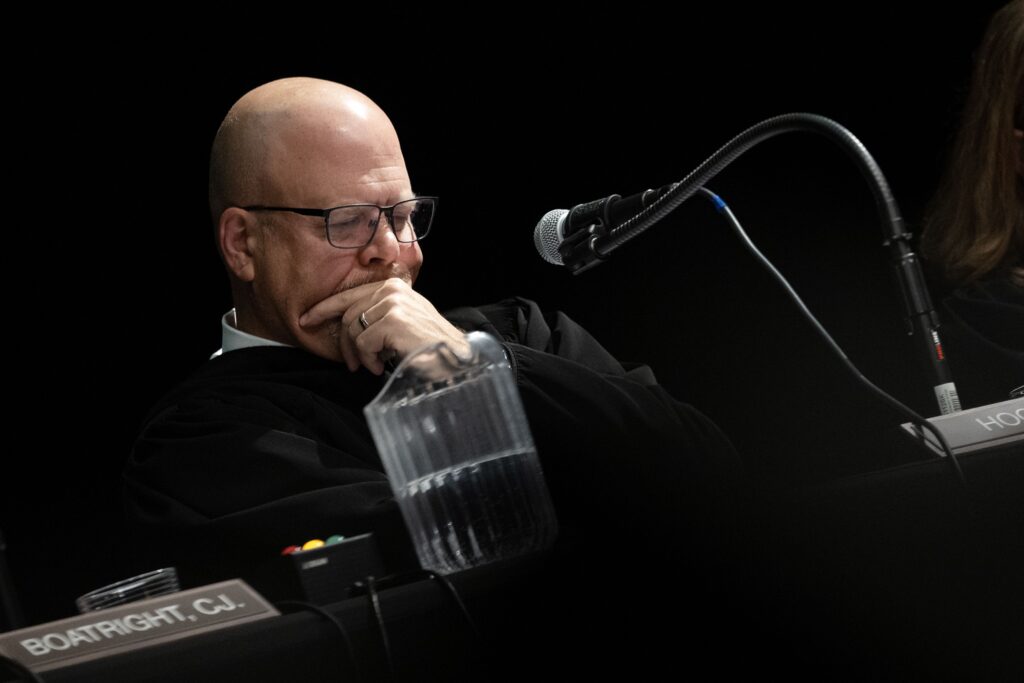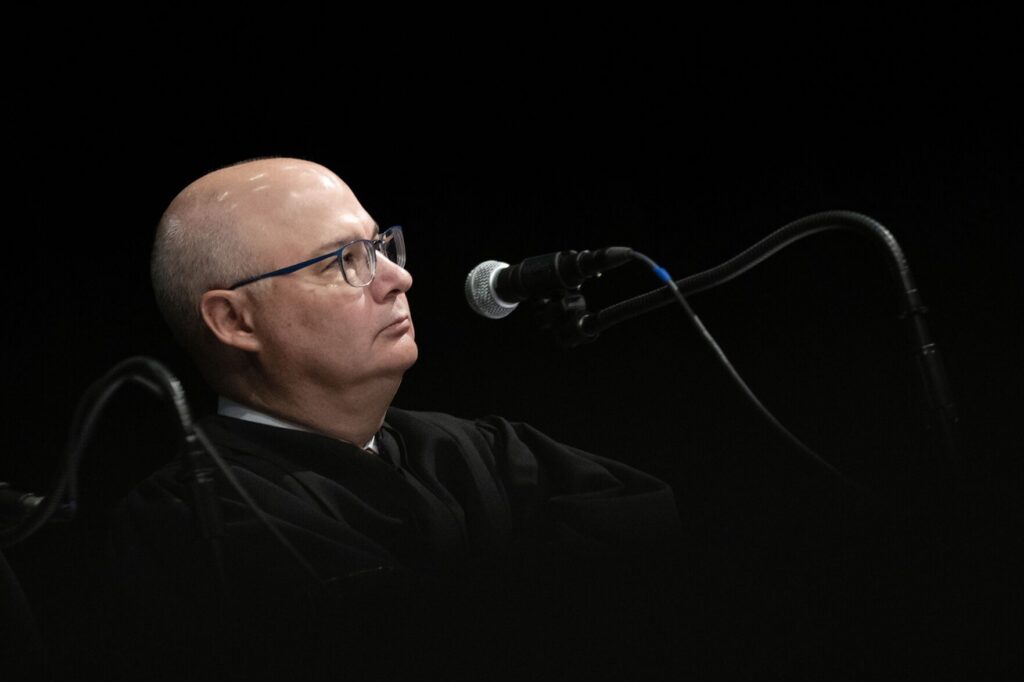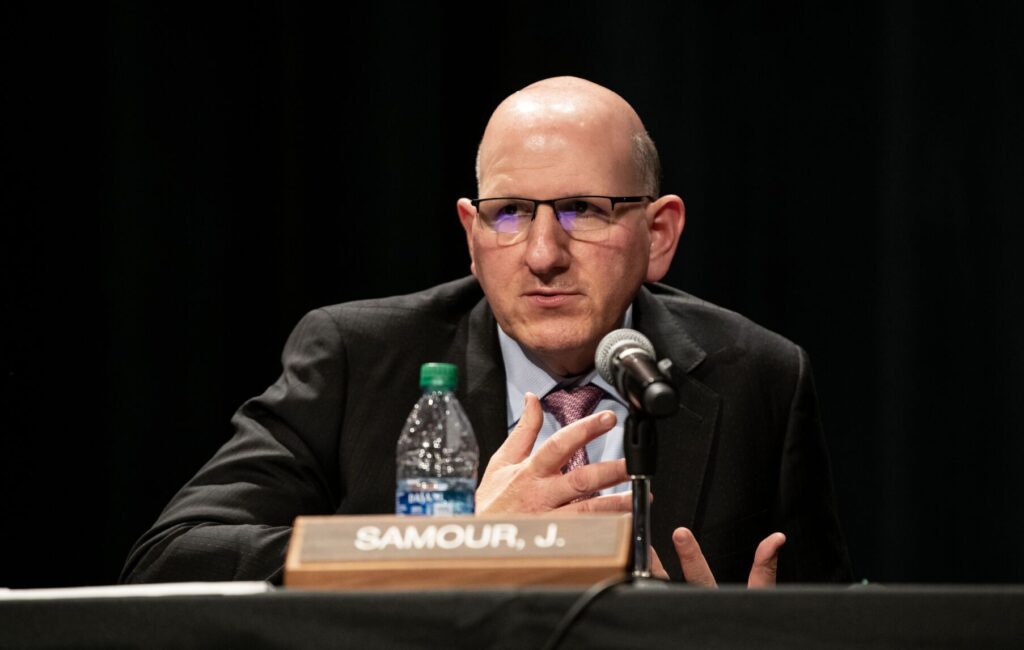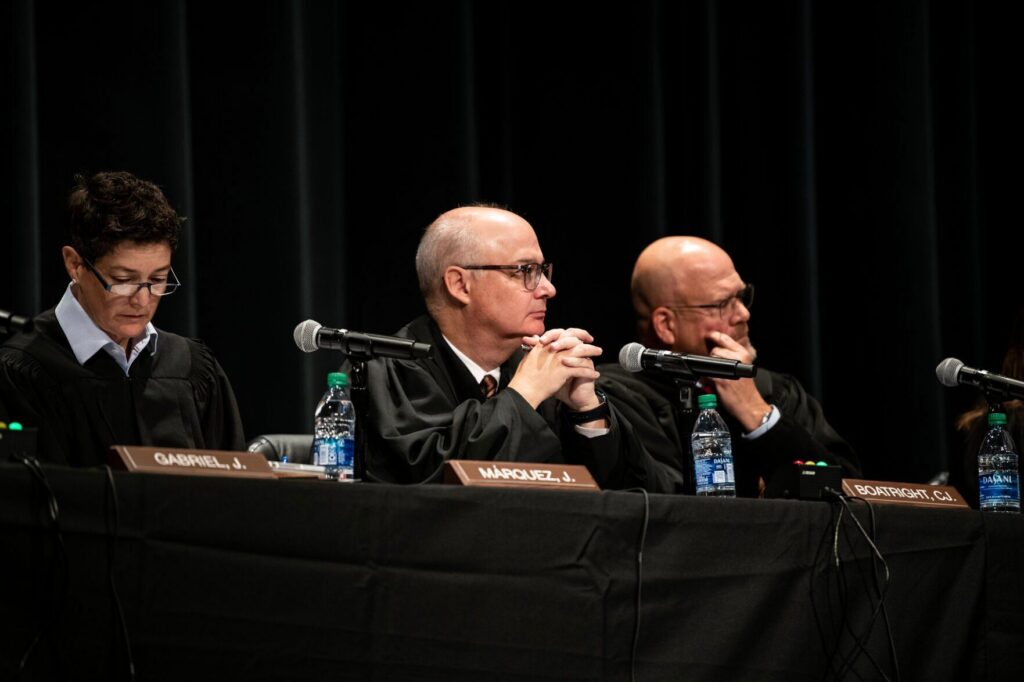State Supreme Court returns for arguments, legislature considers new judges request | COURT CRAWL
Welcome to Court Crawl, Colorado Politics’ roundup of news from the third branch of government.
The state Supreme Court will hear oral arguments in multiple cases this week, plus the General Assembly has begun to consider the judiciary’s request to establish 29 additional judgeships throughout Colorado.
Return for arguments
• Between Tuesday and Wednesday, the Supreme Court will hear oral arguments in three cases:
People v. Bialas and Rios v. People: Both appeals question whether judges violated a defendant’s constitutional right to a public trial during the COVID-19 pandemic by removing spectators from the physical courtroom and requiring them to watch proceedings via livestream.
People v. Ray: In this former death penalty case, Robert Keith Ray is appealing his convictions for a 20-year-old pair of murders, alleging a series of errors at his trial.
• Also, the legislature’s judiciary committees will hold their annual oversight hearing this afternoon for the Judicial Department and related agencies.
Speaking of the legislature
• With the General Assembly back in session, Chief Justice Monica M. Márquez delivered the biennial “State of the Judiciary” address on Friday. It was her first such appearance since taking the judiciary’s top job last summer. Her main focus: asking the legislature to create 29 additional judgeships to alleviate workload concerns.

Chief Justice Monica M. Márquez greets an attendee of Gov. Jared Polis’ 2025 State of the State address on Thursday January 9, 2025 at the Colorado State Capitol. Special to Colorado Politics/John Leyba
• “The state is absorbing hundreds of domestic violence cases following Aurora’s announcement that it will no longer prosecute domestic violence cases in municipal court. Virtual proceedings are placing more demands on judge and staff time,” Márquez said. “For judges in the jurisdictions targeted in the bill, the current situation is unsustainable.”
• Earlier in the week, however, members of the Joint Budget Committee aired their reservations about the request, which would total more than $20 million annually. Given that the state is facing a roughly $672 million budget deficit, some lawmakers warded off the idea of new spending.
• “I want to support adding judicial capacity because prompt resolution of disputes is in the interest of parties on any side of any matter, civil or criminal. The challenge will be addressing judicial’s request in the context of the overall very challenging budget picture. I am working on this as vice chair of Senate Judiciary Committee and will be keeping in touch with my colleagues on the Joint Budget Committee as the session progresses.” —Sen. Mike Weissman, D-Aurora
Judicial discipline report
• The Colorado Commission on Judicial Discipline released its year-end report last week. A substantial portion of the document amounted to a response to reporting by The Denver Gazette that dozens of judges failed to file their annual financial disclosures with the Colorado Secretary of State’s Office on time. The commission said it privately disciplined some judges for breaking the law, focusing on repeat offenders.
• Notably, the commission believed private sanctions were appropriate in light of related behavior at the highest level of the judiciary that has gone unpunished.
• The revelations in Colorado came against “the backdrop of widespread national media attention about U.S. Supreme Court Justices Clarence Thomas and Samuel Alito failing to report lavish gifts from wealthy political donors,” the commission wrote. Judicial ethics experts were intrigued by the commission’s choice to invoke SCOTUS.

FILE PHOTO: News media gather outside the front of the U.S. Supreme Court building in Washington, U.S. September 30, 2022. REUTERS/Kevin Lamarque/File Photo
Q&A with Court of Appeals judge
• Colorado Politics spoke with Judge Timothy J. Schutz, a member of the Court of Appeals who also leads the Colorado Access to Justice Commission’s Courts Committee. He spoke about what the committee is doing or potentially could be doing to help litigants in the civil legal system. Here is an excerpt:
Colorado Politics: It occurs to me that a lot of times, access to justice issues are framed as what’s objectively good. It’s objectively good to have forms in plain English or it’s objectively good to have lower costs for self-represented litigants. But I think sometimes people feel they didn’t get access to justice because of the process they encounter and the outcomes they see in a courtroom. Like, they didn’t realize what types of evidence the judge could or could not consider in their divorce case and they got a bad ruling from that. Or they feel their lawyer didn’t aggressively go after the other party and the judge issued a biased ruling, so they didn’t get access to justice.
Is there anything the Courts Committee can do to address those subjective perceptions of access to justice that leave people feeling just as adrift?
Timothy Schutz: I don’t have a definitive answer of what the Courts Committee specifically could do. But what you are saying is something that should be central to the mind of all judicial officers in my estimation. As a trial court judge, you deal with it in a more immediate and consistent way. Just hearing people and engaging with people in a way that allows them to know that they were heard and their arguments were considered. And that the court took the time to explain the basis of its ruling. That goes an awful long ways to a feeling that the system is accessible.
My experience as a trial court judge was that if I talked to people and looked them in the eye and told them what was going on, why I was doing what I was doing, generally people were pretty accepting of the result. The challenge, multiple challenges, is trial court judges throughout the state are very busy. They work really hard — it sounds “woe is me” — but just the process of handling those cases is a significant burden. So, I think there’s an inclination or a tendency to rush.

Court of Appeals Judge Timothy J. Schutz at the Ralph L. Carr Colorado Judicial Center in December 2024
In federal news
• On procedural grounds, the U.S. Court of Appeals for the 10th Circuit rejected the immigration appeal of a man who was fearful of being forcibly enlisted in the Russian invasion of Ukraine were he to be deported home.
• A federal judge made it easier for a group of a dozen plaintiffs to hold Denver liable for alleged constitutional violations stemming from the 2020 police response to protests.
• Despite a recent Supreme Court decision addressing the line between a government employee’s official and private conduct, a federal judge ruled the city of Aurora may still be held liable for a police officer’s off-duty assault of a woman.
• A judge slammed an “inaccurate” characterization of her ruling in a COVID-19 case, in which plaintiffs attempted to liken a workplace vaccine mandate to coerced human experimentation.
• A Denver police sergeant will face a civil jury trial on the question of whether he unconstitutionally retaliated against a person who was video recording him, or if he unintentionally knocked the camera to the ground.

Photo Credit: kali9 (iStock).
• A judge ordered a hearing to consider the release of a man who has spent 21 months in immigration detention, with no end in sight for his deportation proceedings.
• Although it may not affect the evidence at trial, a federal judge agreed a Denver police sergeant neglected to give a suspect a Miranda warning before asking him potentially incriminating questions.
Vacancies and appointments
• U.S. Magistrate Judge Scott T. Varholak, the most senior member of Colorado’s federal magistrate judge bench, is now the chief magistrate judge, following the retirement of Michael E. Hegarty this month. Hegarty, who had been on the court since 2006, was the first chief magistrate judge after the position was created last year at the magistrate judges’ request.











